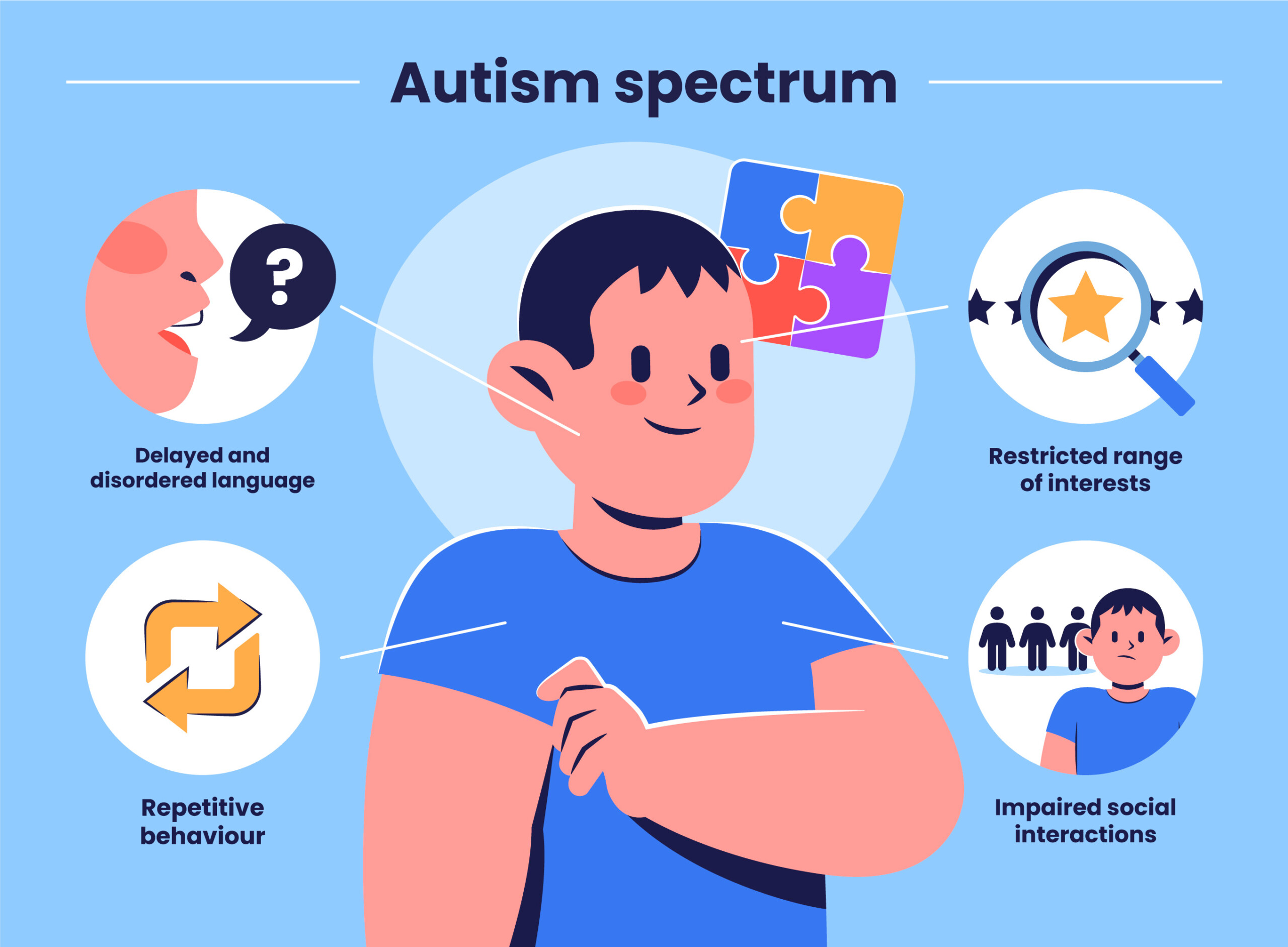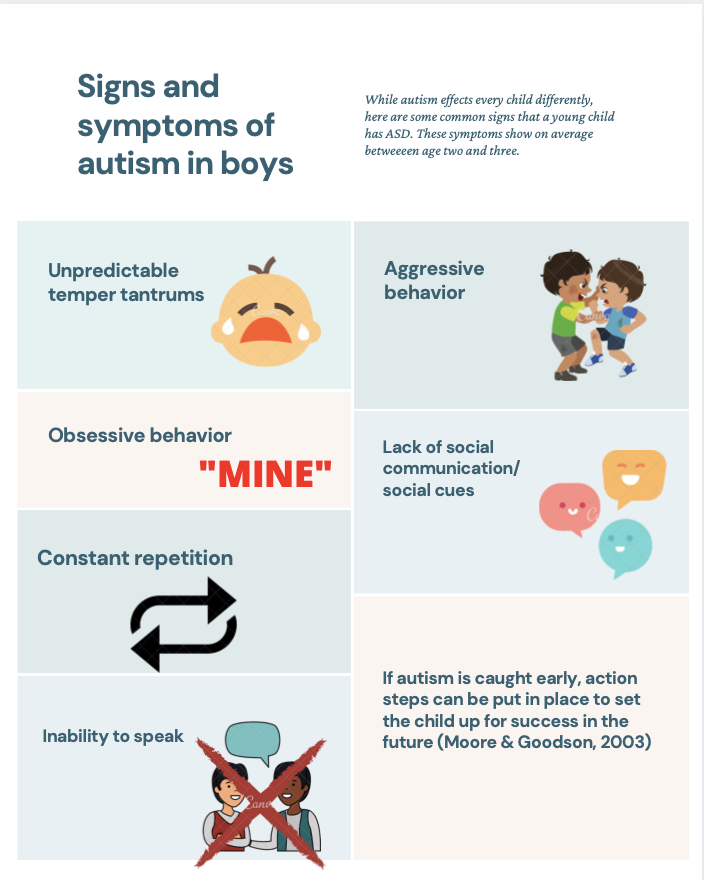The role of structured routines help children with autism—according to an Autism Therapist
The role of structured routines help children with autism—according to an Autism Therapist
Blog Article
Recognizing the Impact of Behavioral Autism on Day-to-day Live and Social Interactions
You could not realize just how deeply behavior autism influences everyday life and social communications. People on the spectrum often browse a globe filled with communication obstacles and sensory overload. These obstacles can cause frustration and seclusion, affecting their relationships and general wellness. Understanding these subtleties is necessary for promoting supportive settings. What methods can we carry out to produce even more significant connections and inclusive rooms? The answers might stun you.
Defining Behavioral Autism and Its Features
Behavior autism, frequently referred to as autism spectrum problem (ASD), includes an array of problems characterized by difficulties in social interaction, interaction, and repetitive behaviors. You could discover that individuals with ASD commonly have a hard time to translate social signs, which can result in misunderstandings in conversations. They may find it difficult to establish eye get in touch with or take part in little talk, making social situations really feel overwhelming.
Communication difficulties can manifest in numerous means, from postponed speech advancement to a preference for utilizing fewer words. By recognizing these attributes, you can foster a setting that advertises acceptance and motivates effective interaction, aiding individuals with autism prosper in their everyday communications.
The Range of Autism: Comprehending Variability in Habits
Autism spectrum condition (ASD) isn't a one-size-fits-all medical diagnosis; it varies widely among people. You might notice that some individuals with ASD exhibit light signs and symptoms, while others may deal with more significant difficulties. This irregularity can materialize in habits, rate of interests, and sensory level of sensitivities. You might run into people that are very spoken and engage conveniently in conversations, while others might choose solitary activities or communicate non-verbally.
Moreover, the method people with ASD react to sensory input can vary considerably; some may be overwhelmed by bright lights or loud sounds, whereas others prosper in promoting atmospheres. The range likewise includes differences in social communications; some individuals may struggle to analyze social cues, while others browse social setups with relative simplicity. Comprehending this variability is necessary, as it aids you value everyone's unique experience and dressmaker assistance to their particular requirements, cultivating a more inclusive atmosphere for everyone.
Interaction Challenges Encountered by People With Autism
When you interact with people on the autism range, you might discover their one-of-a-kind interaction challenges. They frequently encounter difficulties with both nonverbal and verbal signs, which can impact their social communications. Recognizing these barriers is important for promoting far better links and assistance.

Verbal Communication Difficulties
Lots of individuals on the autism spectrum experience spoken communication troubles that can considerably impact their everyday interactions. Your tone, rate, or quantity might not straighten with social assumptions, triggering others to misinterpret your purposes. Acknowledging these challenges can help you and your assistance network establish techniques to improve interaction and foster far better connections with others in your daily life.
Nonverbal Interaction Barriers
Verbal interaction isn't the only challenge people on the autism spectrum face; nonverbal interaction barriers can be equally as considerable. You might locate it tough to interpret body movement, facial expressions, and eye get in touch with, which are necessary for reliable interaction. These challenges can bring about misconceptions or misconceptions of social cues, making communications feel confusing or overwhelming. You might have a hard time to share your own feelings via nonverbal ways, leaving others unclear of your objectives or sensations. This separate can create sensations of seclusion and irritation. Recognizing these barriers is critical for promoting understanding and compassion in your interactions. By attending to nonverbal interaction, you can find methods to enhance your social experiences and boost your total quality of life.
Social Communication Impacts
Social interactions can usually really feel overwhelming due to the special interaction obstacles faced by individuals with autism. You may battle with translating social hints, making it difficult to comprehend sarcasm or body language. This can result in misconceptions or unpleasant moments in conversations. Additionally, launching and keeping conversations might really feel difficult, creating anxiety in social scenarios. You may like organized atmospheres, making spontaneous communications awkward. It's additionally typical to experience problem in participating in view it tiny talk, which can impede forming brand-new relationships. Identifying these obstacles can assist you find techniques to boost communication, such as exercising social abilities in secure setups or using aesthetic help - Autism Behavioral Therapy. Understanding your needs allows you to navigate social interactions with better self-confidence and convenience.
Social Communication and Connection Building in Autism
While building connections can be challenging for people with autism, understanding their unique point of views and interaction designs can foster significant links. You could see that many people on the range favor straight communication and may fight with social hints or tiny talk. By being simple in your interactions, you can aid produce a setting where they really feel comfortable.
Involving in shared rate of interests can likewise offer as a bridge to much deeper connections. Whether it's a hobby, a preferred program, or a mutual passion, these typical strings can open up doors to friendship.
Every Day Life Routine: Navigating Challenges and Approaches
Navigating everyday life routines can be specifically challenging for individuals with autism, especially when unanticipated changes happen. To browse these difficulties, consider implementing visual timetables or lists.
Developing a routine that consists of sensory breaks can also be valuable. This assists develop an understanding environment.
Finally, practice mindfulness strategies to manage stress and anxiety and stress and anxiety. Straightforward breathing exercises or basing techniques can make a considerable distinction. By incorporating these methods, you can boost your everyday regimen and decrease disruptions, making life really feel much more workable.
Strengths and Capacities of Individuals on the Autism Range
Recognizing day-to-day live regimens is simply one element of the autism experience. Lots of individuals on the autism spectrum have remarkable toughness and abilities that establish them apart. You may locate that your interest to information is outstanding, enabling you to stand out in jobs that need accuracy and focus. Your capability to think outside package can bring about cutting-edge services in different situations.
In addition, your memory abilities often radiate, particularly in locations of rate of interest. Autism Therapist. This flair for retaining info can make you an important source in areas like scientific research, technology, or art. You may additionally exhibit solid aesthetic reasoning, enabling you to envision complicated ideas and address problems creatively
Additionally, your unique point of view on the globe can foster empathy and understanding in others, enriching social interactions. Accepting these toughness not only enhances your self-confidence however also assists others appreciate the varied talents you bring to the table.
Creating Inclusive Environments for Individuals With Autism
Creating comprehensive atmospheres for people with autism starts with making sensory-friendly rooms that satisfy their distinct demands. You can also cultivate chances for social interaction, aiding to build connections and relationships. By making these adjustments, you'll contribute to an extra welcoming environment see here now for everyone.
Creating Sensory-Friendly Spaces
While creating sensory-friendly rooms, it's vital to show on the unique needs of individuals with autism. Include peaceful zones where people can reenergize and pull away when overwhelmed. Consist of visual schedules or clear signage to help individuals browse the area confidently.
Advertising Social Interaction Opportunities
Creating sensory-friendly rooms not just addresses individual convenience but additionally sets the stage for purposeful social communications among people with autism. To promote these interactions, develop comprehensive settings that welcome involvement. Arrange structured activities, like art classes or team games, that urge collaboration without frustrating sensory input. Use visual aids and clear interaction to help everybody involve easily. Encourage peer mentoring, coupling individuals with autism with helpful peers that can assist them with social scenarios. Additionally, take into consideration hosting normal community events that celebrate neurodiversity, fostering approval and understanding amongst all participants. By executing these methods, you can boost social chances, helping individuals with autism build relationships and reinforce their social skills in a risk-free, welcoming environment.

Regularly Asked Concerns
Just How Can Pals Assistance Somebody With Behavioral Autism?
You can support a buddy with behavior autism by being person, listening actively, and respecting their boundaries. Involve in tasks they appreciate, connect freely, and create a comfy atmosphere where they really feel valued and recognized.
What Resources Are Readily Available for Parents of Children With Autism?
You can discover numerous sources for parents of children with autism, including support system, academic web sites, and local social work. Linking with various other moms and dads can additionally provide useful understandings and shared experiences to assist navigate obstacles.
Can Behavioral Autism Modification Gradually?

Yes, behavior autism can change in time. You may see changes in communication, social skills, and actions as your child expands. Early treatment and assistance usually play crucial duties in these developmental modifications.
Exactly How Do Sensory Sensitivities Affect Every Day Life?
Sensory level of sensitivities can make everyday experiences overwhelming. You may fight with loud noises or brilliant lights, bring about stress and anxiety or evasion. Finding atmospheres that suit your needs can substantially boost your comfort and overall day-to-day live.
What Prevail Misconceptions Concerning Behavioral Autism?
You could believe behavior autism just affects communication abilities, yet it's more facility. Many presume individuals lack compassion or knowledge, which isn't true. Comprehending these misunderstandings aids foster approval and assistance for those on the range.
Behavioral autism, often referred to as autism range problem (ASD), encompasses a variety of problems defined by difficulties in social interaction, communication, and right here repetitive behaviors.Social communications can frequently really feel overwhelming due to the unique interaction obstacles encountered by people with autism.Designing sensory-friendly areas not only addresses private comfort however also sets the stage for meaningful social communications among people with autism. Urge peer mentoring, matching people with autism with supportive peers who can assist them with social scenarios. By implementing these strategies, you can boost social chances, aiding individuals with autism construct relationships and enhance their social skills in a secure, inviting environment.
Report this page